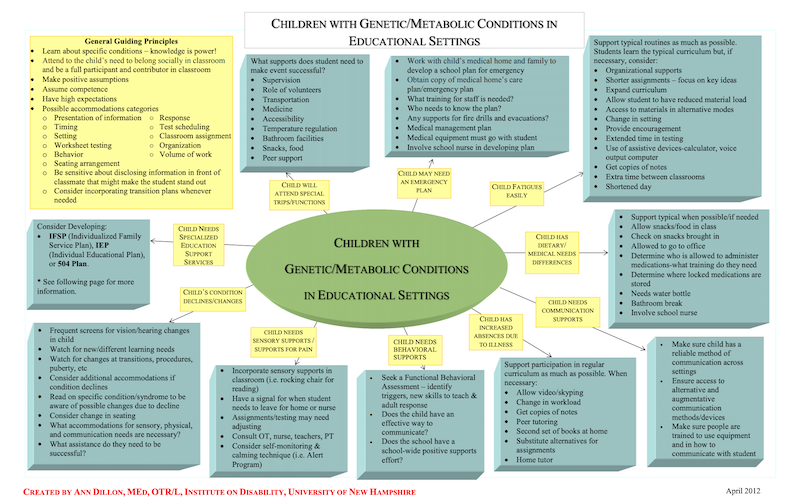
Visual Summary of this information available here
Individualized Family Service Plan
If a child is under age 3* and is found eligible for an early supports and services or early intervention program (names vary depending on the state), an IFSP or Individualized Family Service Plan is developed. This plan is created around the family’s concerns, priorities and resources, not just the child’s, and builds on family strengths. It is a process designed to facilitate the child’s development and serve as a roadmap for the early intervention system.
*Some states continue IFSPs after age 3.
- IDEA - The Individuals with Disabilities Education Act
- IFSPweb- an online assistance program to help families and professionals develop these plans
- National Dissemination Center for Children with Disabilities - Writing the ISFP for Your Child
- IFSP Early Intervention Process
IEPs and 504 Plans
Individual Educational Plans (IEPs) and 504 plans are written for children ages 3-21 who are either in special education programs (IEP) or are in need of extra supports for challenges they have (504 Plan). There are some similarities between the two plans:
Both 504 and IEP Plans:
- Include accommodations and modifications
- Can provide related services such as OT, PT, and speech
- Allow the student to keep the same placement and stay in regular classroom
- Include safe guards
- Parental notices of evaluation or placement
- Parental review of records
- Impartial hearing for appeal
Include possible accommodations categories such as:
- Presentation of information, emergency response, behavioral supports, timing, test scheduling, organization, setting, classroom assignment, volume of work, worksheet testing, seating arrangement
Remember - be careful about disclosing information in front of classmate that might make the student stand out
There are also differences between the IEP and the 504 plan.
The IEP
- Is for children who have a disability and need accommodations, modifications, related and special education services to allow the child to be successful in school.
- Is written when the disability interferes with the student's education and performance.
- Includes Safeguards:
- Written prior notice of all evaluations, changes to IEP and placement
- Right to independent evaluations
- Arbitration or mediation w/disagreement or administrative complaint process
- Allows for direct/indirect services w/student or consultations services between special education teacher and classroom teacher.
For more information on IEPs:
The Department of Education - A Guide to IEPs
Wrightslaw - IEP Frequently Asked Questions
National Dissemination Center for Children with Disabilities - All About the IEP
The 504 Plan
- Is for children who have physical or emotional disabilities, are recovering from chemical dependency, or have an impairment that restricts 1 or more major life activities.
- Is for children who have a condition that impacts major life activities including caring for oneself, performing manual tasks, vision, hearing, speaking, walking, breathing, writing, and learning difficulties.
For more information on 504 plans:
About.com - Children with Special Needs - What is a 504 Plan?
Wrightslaw - Discrimination: Section 504 and ADA
Great Schools - A parent's guide to Section 504 in public schools
